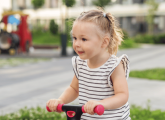Supporting every child, regardless of his or individual needs, has been at the heart of the Montessori pedagogy since its inception, says Barbara Isaacs…
Many teachers and early years practitioners are familiar with the Montessori approach because of its links with special education. Few, however, are aware of the origins of these links.
Montessori trained as a doctor at the end of the 19th century. By the time she graduated, she was already working with young children and their families, primarily mothers. When, in 1897, she was asked to visit Rome’s asylums, she came into contact with children with special educational needs for the first time. They were to change her life forever. Whilst working with these children, she encountered the research of Jean Marc-Gaspar Itard and his pupil Eduard Sequin (in Kramer, Maria Montessori, 1976).
Itard worked primarily with deaf children while Sequin focused on intellectual impairment and established the first schools to support children with learning difficulties in Paris in 1840. Both of these physicians worked on enhancing physical skills and sensory perceptions, as a basis for improving learning opportunities for the children with whom they worked.
Montessori followed their research and developed her own pedagogy, which advocated learning through movement and refinement of the senses. For her “mental deficiency presented chiefly a pedagogical rather than medical problem” (Kramer, 1976). Therefore she embarked on the development of learning materials that would address learning difficulties experienced by the children she observed in the Rome asylum.
Focusing on physical and cognitive development whilst refining children’s sensory perceptions lies at the heart of the Montessori approach today. Montessori also recognised that it was essential to scaffold young children’s learning in small manageable steps and by giving them opportunities to perfect their manipulative skills through repetition of activities.
Another very important element of Montessori pedagogy is the acknowledgement that all children follow predetermined patters of development; however, the speed at which this happens depends on the individual child and on the conditions in which the child is growing up. This led Montessori to the belief that education of young children should provide learning opportunities for the individual, building on her interests and providing for her unique needs. To be able to provide this individualised programme of learning, the teacher needs to be well trained and interested in getting to know each child well by conducting regular observations.
From the early days of Montessori education at the start of the 20th century, children have benefitted from individual learning programmes linked with the use of the Montessori learning materials. The Montessori early years curriculum provides opportunities for development of independence, concentration and manipulative skills. As children engage in activities of everyday living, such as pouring, transferring, buttoning and many others, the adults observe their capacity to manipulate everyday objects and their eye-hand coordination, flexibility of the wrist, capacity to balance and grasp tools.
The sensorial materials that Montessori developed, taking ideas not only from Sequin but also Friedrich Wilhelm Froebel, focus on refinement of individual senses. Children start by working with the largest contrasts such as exploring roughest and smoothest and gradually they progress, through repetitions of activities and scaffolding of skills to recognition of smallest differences – such as the shades of the same colour. The sensorial materials are sometimes also termed as diagnostic tools, as they can help to identify conditions such as colour blindness, hearing impairment, poor muscle tone or lack of ability to group or sequence materials with the same properties. It is for these reasons that teachers supporting young children with special educational needs do turn to Montessori learning materials.
The focus on each child and his spontaneous learning in the environment is the secret of the Montessori pedagogy, where each child is seen as special. There are no special tools or secrets to our work as we focus on the unique nature of each and every one individual and follow their lead.

Mark making EYFS – How to prepare children
Editors picks
